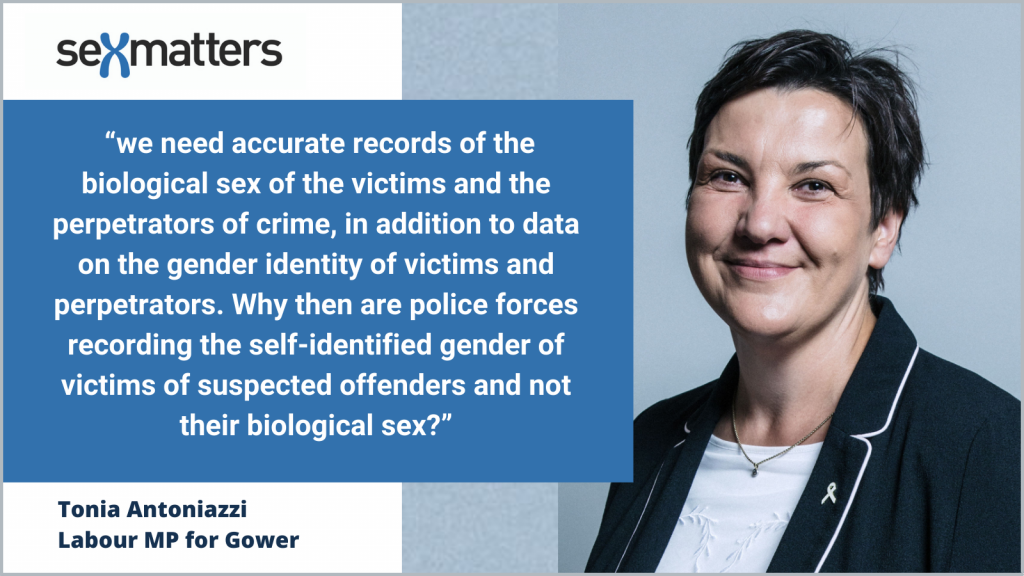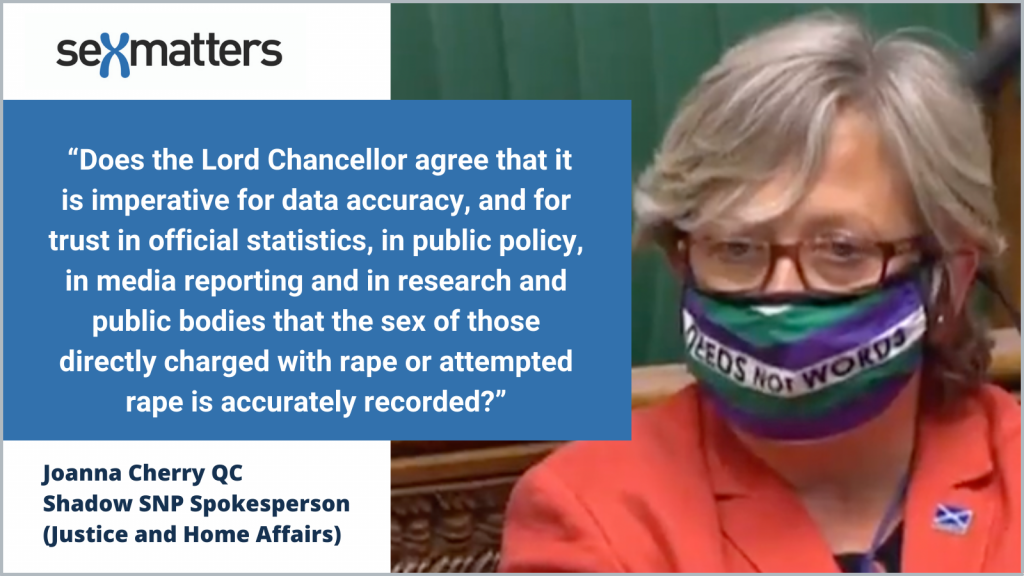Fighting for the principle of collecting data on biological sex

A guest post by MurrayBlackburnMackenzie.
Scottish Parliament Public Petition: Call for signatures
In early June MurrayBlackburnMackenzie (MBM) lodged a petition with the Scottish Parliament Public Petitions Committee. It calls on the Scottish government to require Police Scotland to accurately record the sex of people charged or convicted of rape or attempted rape. More background on the petition is available here. The petition is open for signatures from Scotland and elsewhere until 5 July 2021, and can be signed here. The more signatures are gathered, we think, the more strongly encouraged the Committee will feel to take the petition forward.

Losing sight of sex in data collection: how did we get here?
In October 2018 the Scottish government published a one-page Bill on Scotland’s forthcoming census that sought (unsuccessfully) to introduce a non-binary sex question, and to put the existing sex question on a self-identified basis (still under consideration).
Scotland’s Census Bill ignited a debate on sex and gender identity in data that shows no sign of abating. Since then, a raft of evidence has come to light exposing how numerous public bodies have abandoned data collection on biological sex, choosing to replace it with subjective data on “gender identity”. For example, health bodies allow people to replace the sex marker on their medical records with their self-defined gender identity, instead of recording it in addition to sex. The Higher Education Statistics Agency (HESA) states that HE Institutions should include an “other” category when asking for the sex of staff, as recommended by the Equality Challenge Unit (now Advance HE), “for people who associate with the terms intersex, androgyne, intergender, ambigender, gender fluid, polygender and genderqueer”.
Police forces across the UK allow those suspected and of rape and attempted rape to self-identify as women: Police Scotland state that this approach is “is consistent with the values of the organisation”. The annual Police Scotland “Your Police” survey asks only for respondent’s gender identity. When asked about the lack of a sex question, the Research and Insight Team wrote:
“we know that the gender of a person (which may or may not be the same as they were assigned at birth) is a key factor which shapes people’s experiences of local policing”
and
“Having a question which asks about gender identity, rather than biological sex, is part of our inclusive approach. As we don’t deliver services where the physical sex characteristics of a person would change how we deliver those services… we do not need to know someone’s biological sex characteristics. What is important, is how they identify their gender.”
Policy Capture
A growing body of research has shown how public bodies have privileged the views of groups advocating for self-identified gender policies in decision-making, and failed to consult with data experts on how a loss of data on the protected characteristic of sex might affect data reliability, research and policy (see here and here).
Professor Alice Sullivan’s latest article, published in Political Quarterly, is a remarkable first-hand account of how the ONS ended up in the High Court, unsuccessfully attempting to defend a postmodern “umbrella” concept of sex. Her analysis documents the close relationship between Stonewall and the ONS, and how the Office for National Statistics (ONS) relied on academics wedded to self-identification, from disciplines such as theology, material sciences, law, and gender studies, to claim it had “experts” in its camp. The dysfunctional relationship between lobbyists and the public sector was most recently exposed in a Times article that documented how Stonewall had given the Scottish Government points in its Top 100 Employers index for its “influence on Scotland’s census”.
Fighting for the principle of collecting data on biological sex
As more evidence accrues on the loss of data on biological sex, and sunlight is cast on the underlying policy processes, the pressure on those responsible for the collection, production and regulation of official statistics is intensifying.
In December 2019, 80 of the UK’s leading social scientists wrote to the three census authorities to register their concern about the accompanying guidance to sex question, which advised respondents that they may respond in terms of their self-identified gender. Earlier this year Fair Play for Women successfully challenged the ONS in the High Court, forcing the ONS to change the guidance to legal sex. That FPFW raised over £100,000 to fund the case within two weeks can be read as testimony to the strength of feeling on this issue.
Quantitative social scientists have robustly challenged draft guidance by Scotland’s chief statistician, Roger Halliday, which states that public bodies should not routinely collect data on sex. That the Office for Statistics Regulation (OSR) felt the need to write to Mr Halliday, stating that “I will take a keen interest in your continued work to address any stakeholder feedback you have received and develop finalised guidance which will ensure data and statistics on sex and gender can be produced to best support society’s needs” feels like a shot across the bows.
More parliamentarians are speaking out. Last month Labour MP Tonia Antoniazzi addressed the Commons asked question in a powerful speech on the need for accurate sex-disaggregated data.

“To find effective solutions we must fully understand the problem, and accurate data is key in tackling the causes of crime, protecting the public, providing justice to victims, and rehabilitating offenders. Data must be accurately sex-disaggregated in order to fully understand the impact of all crimes on women and girls. In order to combat sexism, we need to count sex, and in order to combat discrimination against other groups, there is a need to record separate and additional data.”
Earlier this month, SNP MP Joanna Cherry asked the Lord Chancellor a question.

At the time of writing, it is not clear whether the Scottish government will continue with its plans for a self-identified sex question in Scotland’s 2022 census. Officials have stated they are considering the implications of the High Court judgment for Scotland. Meanwhile the OSR is continuing its assessment of the UK censuses to decide whether the outputs are compliant with the Code of Practice for Statistics and should be designated as National Statistics. How the revelation that Scottish government policy on the census has been offered up for Stonewall to score as part of its Top 100 Employers index sits with the Pillar of Trustworthiness in the Code remains to be seen.
About us
MurrayBlackburnMackenzie is an independent policy analysis collective, made up of Dr Kath Murray, Lucy Hunter Blackburn and Lisa Mackenzie. Between us, we have extensive experience in policy-making, research and communications.
We are Edinburgh-based, and work in both a voluntary and a commissioned capacity.
We are currently crowdfunding to support our work. Details of our work to date and our work plans are here. If you would like to donate, the crowdfunder is open until 4 July. You can also make a donation to support our work.
